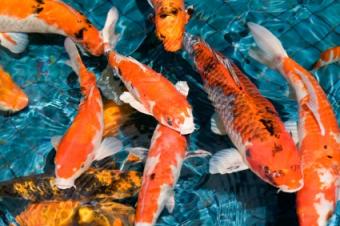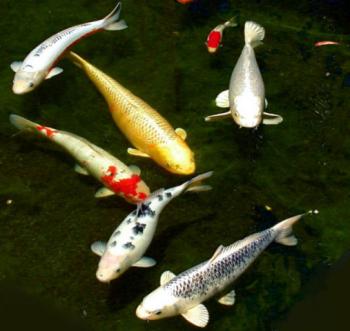Koi (Cyprinus carpio)

Koi (Cyprinus carpio) are freshwater fish that belong to the family Cyprinidae, which also includes goldfish, to which they are closely related.
Koi are most commonly kept in outdoor freshwater ponds, but can sometimes be kept in very large aquariums. Wild koi can reach a maximum size of about 50 inches (1 meter or more) and so you must keep this in mind when determining where to house your koi. Don't attempt to keep koi in an aquarium that is too small for them!
Although some people do manage to keep koi in very large aquariums it is usually best to keep them in a large koi pond (minimum size - about 1000 gallons). In this way they'll have plenty of swimming room. In addition, a koi pond can be quite relaxing and can make a beautiful addition to your back yard.
If you are interested in building a koi pond here is a great resource to get you started: Steps for Building a Koi Pond.
The above link not only has information on what you need to build a koi pond or goldfish water garden, but also has lots of supplies you'll need to start and maintain your pond.
Feeding Your Koi & Care Requirements
Koi are omnivores, meaning that they need both meat and plant based foods. It is very important to feed them meaty foods as well as vegetable matter. Koi will readily eat all fish foods. If you've ever had the pleasure of feeding koi then you know that they eat quite readily. In fact, they will even take food directly from your hand.
You can buy commercially prepared foods designed for koi, usually in pellet form. There are even different types of koi foods based on the seasons. This is because fish are cold blooded and their metabolism slows down when the water temperature is cooler and speeds up when the water temperature is warmer and so foods with different properties can be used at different times of the year. Koi will also eat shrimp, watermelon, peas, and lettuce.
The water temperature for your koi should be between 50-86 °F (10-30 °C). However, they can withstand temperatures slightly lower and slightly higher than this, but it is best not to keep them at extreme temperatures for very long.
An excellent resource for a feeding your koi, as well as a good feeding schedule What to Feed Koi Fish.
Breeding Koi
Koi kept in ponds typically spawn in the spring or early summer. What seems to induce spawning behavior is a period of cooler water temperature followed by a warm-up. Male and female koi look similar to one another, but females usually have a more rounded body shape when they are sexually mature.
One interesting fact about koi is that they will interbreed with goldfish. Even more interesting is that the hybrid offspring are fertile.
Koi (and goldfish) scatter their eggs among the vegetation. Most koi breeders use spawning mops because this allows you to remove the eggs (on the mop) and place them in their own aquarium for rearing.
Koi fry are pretty tiny and mostly colorless. They develop their colors as they get older.
Koi Varieties
There are many koi varieties. The photo below depicts six varieties and color varations of koi (although there are many more).

Please note that the small red and white fish at the top of the photo is actually a goldfish. The other six fish are koi.
Here are the koi varieties from the top of the photo to the bottom:
- Shusui - mostly blue body with red or orange markings (although it is hard to tell that the fish is blue in this photo).
- Diamond Platinum Ogon - the solid white fish
- Ogon - the yellow fish
- Kohaku - white body with red markings
- Bekko - white fish with black markings. However bekkos can also have a red or yellow body color as well.
- Asagi? - Blue body with red or orange fins and underside. However, this fish doesn't appear to have red fins and so I'm actually not sure on this one. The photo author (Stan Shebs) described it as Asagi, but also didn't seem to be totally sure about this one.
For a good site that describes many koi varieties with photos please visit Blueridgekoi.com koi variety guide.
Koi cost about $120 each.
